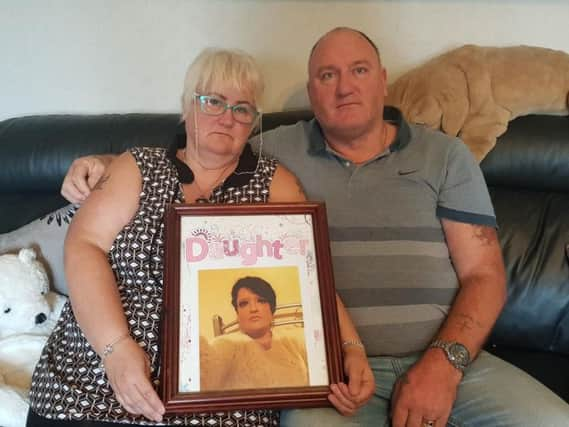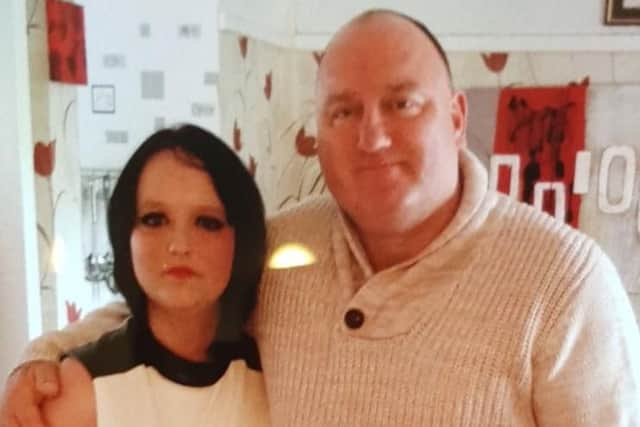Parents of Blackpool woman who died of meningitis after being diagnosed with 'panic attack' say they are still waiting for an apology


In the space of just a week, 25-year-old Sarah went from complaining of numb fingers at the walk-in centre in Whitegate Drive, Blackpool, to having her life support machine switched off at the Victoria Hospital.
What happened in that time is something mum Kathleen, 51, and step-dad Alan Davies say they still want details on.
Advertisement
Hide AdAdvertisement
Hide AdAlan, 54, said: “I believe if my daughter had the right information given to her at the time, she would still be alive today.”


Sarah, who had learning difficulties and lived in Kipling Drive, Marton, went to the GP-led walk-in centre in November 2014 and, after being examined, was given medication and told to see her usual doctor.
Two days later, Sarah, who also suffered with a blood disorder and lupus, an incurable immune system illness, was taken to A&E, Mr Davies said from his home in Warton.
“We were at home and Sarah’s boyfriend rang and said he was concerned about her,” he said.
Advertisement
Hide AdAdvertisement
Hide Ad“He said she was slurring words, really confused, and was thinking her thumb was a lighter – and she had numbness down the right side of her.
“I told him to call for an ambulance, so she went into the A&E at Blackpool Victoria and they later sent her home in the evening, saying she had had a panic attack.
“In the morning, Sarah rang Kathleen and said ‘Mum, I’m going to have a bath,’ and that is the horrible part because shortly after her friend phoned and said Sarah has collapsed on the bathroom floor.”
Sarah was taken back to the Vic, where she was given a scan and moved onto the stroke ward.
Advertisement
Hide AdAdvertisement
Hide AdHer health deteriorated over the coming days, and she was put on a life support machine, which Mr and Mrs Davies made the agonising decision to turn off.
An inquest concluded Sarah died of natural causes from acute pyogenic meningitis, a rapidly developing inflammation of brain and spinal tissue.
Since then, her parents say they have been questioning the ifs and whys about her care at the Whinney Heys Road hospital unit, and even launched legal proceedings, which have since stalled.
“They had all Sarah’s medical history when she was in the ambulance, including that she was at a high risk of having a stroke,” Mr Davis said.
Advertisement
Hide AdAdvertisement
Hide Ad“So I don’t know why this nurse took it on herself to say Sarah was just having a panic attack. I can’t understand why.
“Me and my wife believe if she had been kept in on her first admission she would still be alive, although she might have sustained some brain damage, but she would still be alive.
“I wouldn’t wish it on anybody, when you have to turn your daughter’s life support off because they say all of her organs are failing.
“It’s one thing I wouldn’t wish anyone to go through.
Mrs Davies added: “What my questions are with the hospital is they must have known she had lupus on the brain and had a blood disorder. Why didn’t they take blood and why didn’t they do brain scans?
Advertisement
Hide AdAdvertisement
Hide Ad“Because it could have been that making her like she was. But they didn’t, they just sent her home.”
Sarah’s death triggered a serious untoward incident (SUI) investigation at the hospital, which concluded that “although there are lessons to be learnt surrounding the patient’s care, it is unlikely a change in care plan would have impact on the patient’s outcome”.
In a statement to Blackpool’s coroner Alan Wilson, A&E nurse Heather Morgan said her “memory of this lady is minimal” and referred back to her triage notes from November 26, 2014, when Sarah arrived by ambulance.
“Sarah advised she was watching a film, started coughing, then couldn’t get her breath,” she wrote in documents seen by The Gazette.
Advertisement
Hide AdAdvertisement
Hide Ad“This resulted in her panicking and then she started hyperventilating. An ambulance was called but, while waiting for its arrival to her home, Sarah managed to calm herself down.”
Ms Morgan said Sarah told her “she now felt back to her normal self” and, after talks with Fylde Coast Medical Services, which runs the hospital’s Urgent Care Centre, she was transferred into the care of medics there.
Senior nurse Jacqueline Baseley, who saw Sarah at the Urgent Care Centre, said she “had been brought in by ambulance and triaged by the A&E staff and deemed suitable to be seen by nursing staff as an anxiety attack”.
After an examination, she said: “I discussed with both Sarah and her boyfriend that I felt it was more of a panic attack.”
Advertisement
Hide AdAdvertisement
Hide AdShe added: “I am sorry Sarah eventually became unconscious and went on to pass away. Hindsight is a wonderful thing and I have learned that should I ever seen anyone presenting themselves in a similar situation I would refer to medics or pass it over the GP working with me.”
The hospital’s report, which followed its internal investigation, said Sarah was admitted to the Emergency Department after collapsing the next morning.
“After examination, she had a CT scan which the doctors felt showed a most likely diagnosis of a stroke and so she was transferred to the stroke unit to await further investigations, including an MRI scan,” it said.
“During the next few days, the patient’s condition changed, and she had another CT scan which confirmed the diagnosis of a stroke but sadly she deteriorated and passed away on December 1, 2014.
Advertisement
Hide AdAdvertisement
Hide Ad“The purpose of the investigation was to review the care given to the patient and to identify if there were any gaps in case, or anything we could have done differently that might have affected the patient’s outcome.
“The investigation found that, although there are lessons to be learnt surrounding this patient’s care, it is unlikely a change in care plan would have impacted on the patient’s outcome.”
The report concluded Sarah had been “assessed by a senior nurse” during her first visit to the hospital, and “diagnosed with an anxiety attack”.
It added: “She was advised to rest and was discharged from the centre and advised to return if any problems reoccurred.”
Advertisement
Hide AdAdvertisement
Hide AdIt also said Sarah was unable to have her MRI scan “due to her agitation” after her collapse and admission the next day.
The report added: “Following a full investigation, it was felt that, even if the patient had undergone an MRI scan, it was highly likely she would have been left severely disabled.
“Therefore, the stroke consultant suggested it be reflected within this report that, unfortunately, even if the treatment plan was different, the outcome for the patient would have been the same.”
A spokesman for Blackpool Teaching Hospitals NHS Trust, which runs the hospital, said it was unable to comment due to the legal battle, which it is understood stalled several years ago.
Fylde Coast Medical Services said the nurse who saw Sarah at the Urgent Care Centre was “not employed by us”.